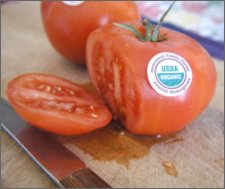So Now What Exactly Does Certified Organic Mean? Is it Really Organic?
by www.SixWise.com
As though deciphering the myriad of food labels out there
wasn't hard enough already, now lawmakers have added one more
piece to the puzzle, this time regarding organic food.
It all started with a federal court ruling earlier in 2005,
in which a federal court ruled to severely limit the use of
synthetic substances in organic food. At face value, it seems
this would be fine to organic manufacturers because, after
all, doesn't "organic" imply no synthetics?
|

Congress has added a last-minute rider to a USDA spending
bill that allows 38 synthetic ingredients in organic
foods.
|
As it turns out, no. The court ruling prohibited 38 ingredients
in all, among them ascorbic acid, a form of vitamin C used
as an additive; pectin, a jam thickener; and hydrogen peroxide.
It also banned dairy herds in the process of becoming organic
from being fed feed that was partially non-organic.
According to some members of the organic community, including
the Organic Valley farm coop in Wisconsin, the move was so
severe that it would have threatened the industry's growth.
Organic Valley, for one, used hydrogen peroxide to sterilize
their cartons. Under the new ruling, they would have been
forced to change their organic label.
"When we took a look at what the [court] ruling did
to organic milk, we were aghast," said Theresa Marquez
of Organic Valley. "It would have a huge impact both
financially and from a marketing point of view," Marquez
said.
Congress has since intervened, adding a rider to a 2006 U.S.
Department of Agriculture (USDA) spending bill that allows
organic food makers to resume using the 38 synthetic ingredients.
Organic Trade Association Sought Synthetics Allowance
Ironically, it was the Organic Trade Association (OTA), which
represents North American businesses that grow and market
organic foods, which sought the intervention.
"Without those two key provisions, the face of the organic
industry and the marketplace for organic products would have
changed dramatically," said Katherine DiMatteo, executive
director of OTA.
They maintained that businesses, farmers and consumers alike
all supported the provisions. However, the Organic Consumer's
Association (OCA) has a different story to tell.
They say the new legislation was prompted by giant food corporations
new to the organic market and eager to earn their share of
the growing industry. In fact, Congress received a reported
320,000 letters and phone calls from organic consumers who
protested the rider being passed.
"The process was profoundly undemocratic," said
Ronnie Cummins, director of OCA. "The end result is a
serious setback for the multibillion-dollar alternative food
and farming system that the organic community has painstakingly
built up over the past 35 years ... Industry's stealth
attack has unnecessarily damaged the standards that helped
organic foods become the fastest growing sector in the food
industry."
Others echo these sentiments, including Eden Foods CEO Michael
Potter, who says the move is a bad one for both organic businesses
and consumers.
|

Will the "USDA Organic" seal one day become
sub-par?
|
What Does Organic Mean, Then?
While the organic industry is divided over the use of synthetics,
one thing's for sure: the market is here to stay. Close to
40 percent of Americans buy organic foods, and sales are expected
to reach $30 billion by 2007.
The organic market has grown so much, in fact, that the OCA
reports "10 cents of every grocery store dollar spent
by American consumers today goes for organic, made with organic,
and natural products." So what does the "organic"
label really mean?
All organic agricultural farms and products must meet the
following guidelines (verified by a USDA-approved independent
agency):
-
Abstain from the application of prohibited materials
(including synthetic fertilizers, pesticides, and sewage
sludge) for 3 years prior to certification and then continually
throughout their organic license.
-
Prohibit the use of genetically modified organisms
and irradiation.
-
Employ positive soil building, conservation, manure
management and crop rotation practices.
-
Provide outdoor access and pasture for livestock.
-
Refrain from antibiotic and hormone use in animals.
-
Sustain animals on 100% organic feed.
-
Avoid contamination during the processing of organic
products.
-
Keep records of all operations.
The OCA maintains that they will seek to reverse the rider
in the future, but until then, keep
in mind that while 38 synthetics are now allowed in organic
foods, conventionally grown foods are allowed thousands.
The Food and Drug Administration (FDA) maintains a list of
over 3,000 chemicals that are added to the processed food
supply.
But some say you may want to keep an eye on organic standards
in years to come, so what starts as 38 doesn't balloon without
a limit.
"We're concerned that the amendment could allow a whole
host of processing aids and synthetic substances to be added
without any review," says Joe Mendelson of the Center
for Food Safety.
Indeed, it seems some members of the organic community are
bracing themselves for a fight. Says the OCA:
"If the USDA and the dominant companies in the OTA
continue to ignore consumer and organic community expectations,
especially the expectations of small and medium-sized farmers,
retailers, and companies, we will set up our own label,
certification, and accreditation system and point out to
consumers that "USDA Organic" means "grade
B organic," and that consumers looking for "grade
A" will have to look for our new label."
Recommended Reading
Food
Nutrition Labels: Six "Catches" You Need to Know
Is
Pasteurization More of a Health Risk or a Safety Benefit?
Sources
Organic
Consumers Association: US Lawmakers OK Some Synthetics for
Organic Food
Organic
Farmers Divided Over Synthetics
Food
Consumer: Updated OCA talking points on safeguarding Organic
Standards
Boise
Weekly November 30, 2005